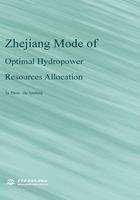
2.1 Scarcity of Hydropower Resources
Natural resources are regionally featured in terms of spatial and temporal distribution.The reserves of natural resources are of relative scarcity to human desires,which makes the supply of natural resources much less than demand.Hydropower resources,as a type of natural resource,is also scarce.
2.1.1 Scarcity of Resources
In comparison with the infinite desires of human society,economic goods,or to say the resources required to produce economic goods,are always insufficient.This relatively limited nature of resources is scarcity.The infinite desires of human society are of different degree of importance or urgency.So to address the problem of scarcity,human society should make a choice of how to utilize the resources.Options should be prioritized by answering three relevant questions:First,what and how much goods to be produced?Second,how to produce?Third,how to distribute the products?
Scarcity is an ever-lasting topic that human society faces throughout the ages.The above three questions,namely,what,how and for who to produce,have to be answered by human society.This is the problem called resources allocation,an ever-lasting problem that human society should be faced with.
Optimal allocation of resources,serving as basic requirement for and representation of economic development,refers to the organic combination of modern technological achievements and various input factors for the purpose of minimize macroeconomic waste and maximize social welfare.Through constantly adjusting resources input based on the difference between the individual margin and average margin,optimal allocation of resources can maintain the competitive microeconomic advantage and maximize macroeconomic efficiency[1].
Efficiency is generally defined as a level of performance where human needs are satisfied to the greatest extent with restricted resources and technical conditions.Economists define resources allocation efficiency from several perspectives.Pindyck regards allocative efficiency as“sum total of consumers'and producers'welfare”[2],while Samuelson thinks that“efficiency means no waste”,and an efficient economy is on its production possibility frontier[3].Efficiency in general resources allocation usually is synonymous with Pareto optimality or Pareto optimal,referring to a situation in which the profit of one party cannot be increased without reducing the profit of another with given production technology,consumer preferences and national income distribution.Pareto optimality is necessary for optimal resources allocation,but not sufficient for welfare maximization.Classical economic theory holds that a balance between supply and demand would be automatically reached under market mechanism,and such a balance is efficient[4].
2.1.2 Scarcity of Hydropower Resources
The scarcity of hydropower resources,an essential part of water resources,contains two ideas:hydropower resources is comparatively scarce to the huge energy demand and to the demand of clean energy in China.
In the primary energy structure,coal accounts for about 75%,oil 17%,gas 2%,hydropower 6%,nuclear power 0.4%,and other clean energy(wind,geothermal,solar)of very small proportion.In terms of sustainable development,China has the largest emission of SO2 and second largest emission of CO2,causing smog over half of China,severely harming people's health and hampering stable economic development.Coal-based energy structure is partially blamed for it.
The current energy structure posed a serious threat on economy and environment.Corresponding strategy would be energy saving and efficiency improving.It is the basic national policy to reduce energy consumption year on year,and at the same time actively develop new and renewable energies.
The most practical way of developing renewable energy would be exploiting hydropower resources.As a renewable energy,hydropower can be developed at a low cost with mature engineering technology.Hydropower operation does not consume fuels,nor discharge harmful substances.Compared with thermal power,hydropower is cost effective in operation and generation,and more friendly to environment.The effective use of hydropower resources,improvement of environmental friendliness in utilizing existing energies,upgrading energy consumption in rural and remote areas,these would strongly support the future development.Currently,there are about 400 large-sized or medium-sized hydro plants,and more than 45,000 small hydro plants,with installed capacity totaling 200 million kW.China has become the incomparable country of hydropower.The accumulative hydropower output amounts to 670 million kW·h,equivalent to the electricity generated by 2.64 billion of standard coal,reducing CO2 emission by 6 billion tons.Therefore,sufficient development and utilization of restricted resources can bring forth both economic and ecological benefits.
Nevertheless,the exploitable capacity of hydropower resources is not sufficient for the rapidly increasing demand for energy.The scarcity is represented in insufficient total quantity and poor distribution structure.Most of the hydropower resources are located in southwest part of China,whereas the big energy demand comes from the developed eastern coastal area.It is therefore not an easy task to meet the 2020 emission reduction targets we committed.
It is of high necessity to fully utilize the limited hydropower resources,improve the utilization efficiency,raise the proportion of hydropower in the energy structure and reduce the proportion of fossil fuel energies so as to decrease environmental pollution and promote stable economic development.By 2010,the total installed hydropower capacity has reached 2,000 billion kW,ranking the first in the world,but it only took up 23%of the entire power generation capacity,a rather low proportion compared with thermal power capacity taking up over three fourths.